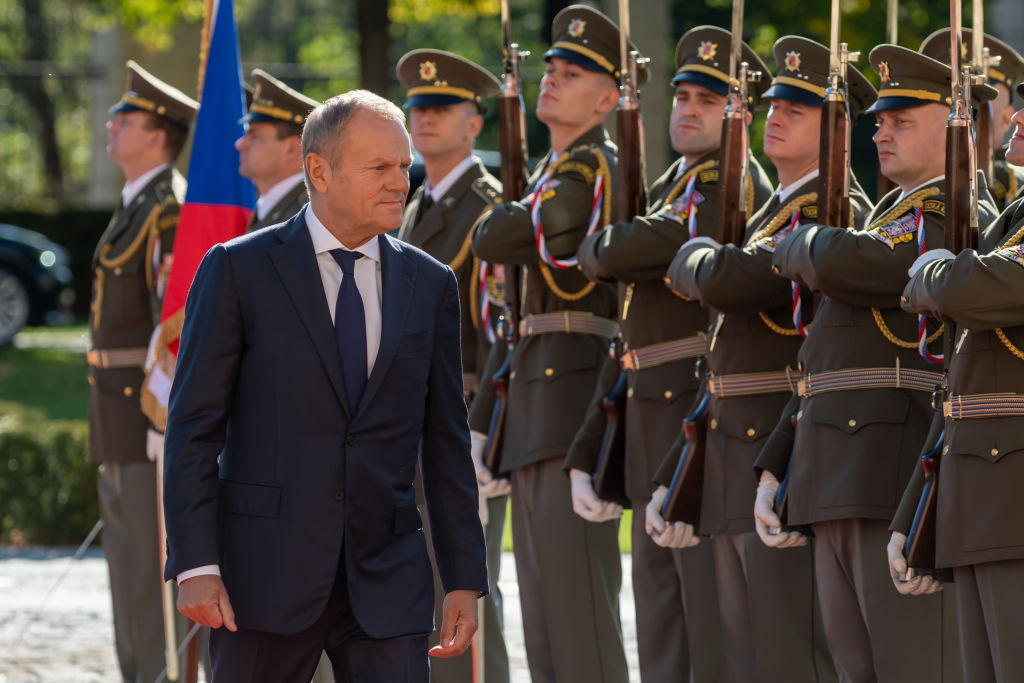Donald Tusk shocked Europe this weekend, but for completely different reasons than anyone might have imagined. Poland’s Prime Minister, formerly European Council president, announced that his government would be “temporarily” suspending migrants’ right to asylum, a cornerstone of international migration law. He backed this up by claiming the procedure had been abused by Belarus and Russia in its ongoing hybrid war against Poland. The concrete benefits of such a move for Poland’s security remain muddled — but its impact on European migration discourse cannot be overstated.
Tusk’s decision, which apparently surprised even his own governing coalition, comes after months of a steady hardening of Poland’s migration policy. This has accelerated following an incident in June, when a Polish soldier was killed by someone — a migrant, a smuggler, or even perhaps an undercover Belarusian servicemember — on the opposite side of the country’s border fence with Belarus. Since then, Tusk’s centrist government has reinstated a military exclusion zone along the border that had initially been implemented by his political rivals in 2021, broadened permissions for security services to use firearms along the border when confronting migrants, and boosted efforts to build a wall of fortifications along Poland’s borders with Russia and Belarus.
While asylum claims have risen in Poland in the first half of 2024, most have come not from non-European groups who make up the bulk of irregular migrants on Poland’s eastern border, but instead from Ukrainian and Belarusian nationals. Unless there is something we don’t know, Tusk’s latest move — like much of his shift on migration issues since his government took power late last year — is almost certainly motivated primarily by domestic political concerns. The border issue is one of few topics on which most Poles largely agree — 86% of the population stated in a July survey that they were in favour of allowing soldiers along the border to use lethal weapons when necessary to deter hostile individuals.
With a presidential election looming next year, Tusk’s new pronouncements on the issue constitute an effort to solidify support across Poland’s political spectrum at a time when his government is undertaking a highly divisive effort to rein in the legacy left by his predecessors, the Right-wing Law and Justice Party. Tusk’s Foreign Minister, Radosław Sikorski, admitted as much last month, saying he didn’t think their party would have defeated Law and Justice had they not “outflanked” their rival on migration.
But the immediate consequences of this latest move have already been felt far beyond Poland, and have triggered warnings from the European Commission. This is not the first time that an EU member state has suspended the right to asylum as a result of Kremlin hybrid activity — Finland voted to refuse entry to asylum seekers at its crossings with Russia last year. However, for a Brussels insider like Tusk to take such a step has sent shockwaves across the continent’s establishment, showcasing just how far the pendulum has swung on migration in the EU. Gone are the days when far-Right firebrands were the only ones calling for the suspension of internationally accepted human rights in service of border security. What had once been unthinkable in Europe has become near-mainstream overnight.
That not even Law and Justice had openly advocated for a similar move showcases just how much the ground has shifted under not only Tusk, but also the European institutions he has come to represent in the span of a few short years. In many ways, his adoption of such a radical position is an admission that advocates of fundamental changes to European — and perhaps even global — migration policy can no longer be ignored, and that fears of threats to national sovereignty, real or perceived, have decidedly trounced concerns about upholding liberal values for the continent’s voting majorities. Where Tusk’s decision will take the EU remains murky, but it’s clear that Europe will never be the same again.











Join the discussion
Join like minded readers that support our journalism by becoming a paid subscriber
To join the discussion in the comments, become a paid subscriber.
Join like minded readers that support our journalism, read unlimited articles and enjoy other subscriber-only benefits.
Subscribe